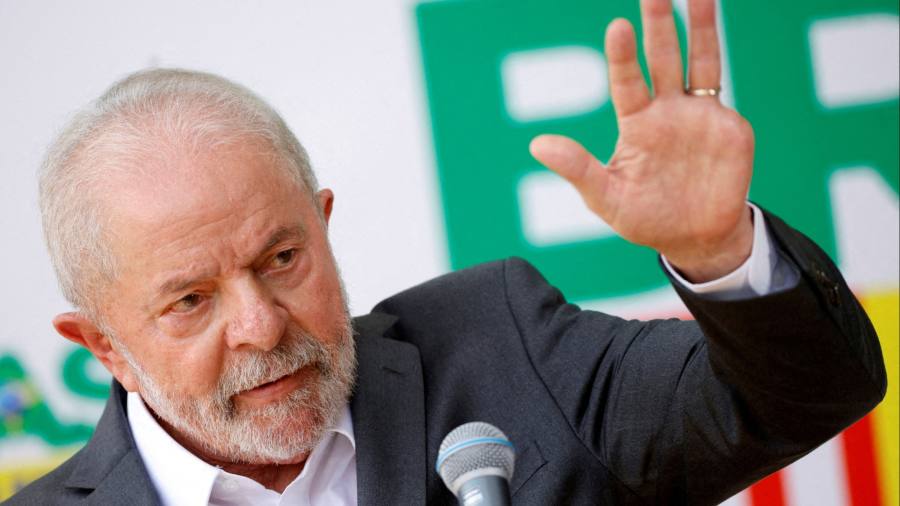[ad_1]
Luiz Inácio Lula da Silva won the Brazilian presidency by promising voters that the good times of “steak and beer” would return to Latin America’s largest country.
But as the leftwing leader prepares to take office on January 1, he faces a darkening economic outlook. Growth forecasts for 2023 have been revised down over concerns on the impact of high interest rates, fiscal uncertainty and the broader global slowdown.
“When you put all these elements together, external and domestic, we see a strong deceleration of the Brazilian economy next year,” said Alessandra Ribeiro, an economist at consultancy Tendências.
Lula presided over a period of strong growth during his first stint in office from 2003 to 2010, as a boom in commodities exports powered expansions in output of 4 to 5 per cent a year. Wages rose, the middle class expanded and millions of Brazilians were lifted out of poverty.
But the incoming president now faces an entirely different environment. While the agribusiness sector remains strong and unemployment has fallen to about 9 per cent — the lowest level in seven years — the economy is having to digest a series of interest rate rises aimed at taming inflation. The rate rises to the current level of 13.75 per cent weigh on growth by limiting consumer consumption and business investment.
“There are clear signs that credit is becoming scarcer and more expensive,” said Marcelo Fonseca, chief economist at asset manager Opportunity. “With very high interest rates we can expect consumption to slow down very quickly.”
The economy also remains hamstrung by deep structural inefficiencies, low wages and a long-term trend towards deindustrialisation.
The government last month revised down its official 2023 growth forecast from 2.5 per cent to 2.1 per cent. Independent economists, however, are even more pessimistic, with a consensus survey pointing to growth of just 0.8 per cent.
“There is the context of the global slowdown, which affects us. But we also have the more pronounced effects of high interest rates and the exhaustion of the post-pandemic services recovery which helped the economy a lot this year,” said Ribeiro.
She predicted unemployment would fall over the next 12 months, but at a slower pace than this year, probably ending 2023 at 8.2 per cent.
A key concern for Fonseca and other economists is how the Lula administration approaches fiscal policy. On the campaign trail, the former trade unionist pledged to increase spending on social assistance programmes, telling voters “the wheel of the economy will turn with the poor being part of the budget”.
Brazil’s Congress this month passed a constitutional amendment that allows the incoming administration to maintain the flagship Bolsa Família cash handout, the main social welfare programme, at R$600 (US$116) per month by circumventing the country’s spending cap rule.
The move has sparked concerns that the incoming administration could abandon its professed commitment to fiscal responsibility.
Economists fear that investors will be moved to quit Brazil if the country’s debt-to-GDP ratio — now at almost 80 per cent — begins to soar next year, further weakening the exchange rate and stoking inflation. This, in turn, would force the central bank to keep rates higher for longer, further curbing growth.
“The outlook next year is very mediocre,” said Fonseca. “And with a loose fiscal policy, I don’t see a stronger rebound in the years to come.”
Gabriel Leal de Barros, partner at Ryo Asset Management, said a loose fiscal policy resulting in rising government expenditure would create multiple knock-on effects and could potentially jeopardise a long overdue and much-needed tax reform.
“We would have to raise some taxes or find some money to pay for expenditures. We won’t have space or time to focus on the efficiency and structural problems of taxation in Brazil,” he said.
“Even the green agenda, which is one of the best opportunities we have, depends on the guidelines for fiscal solvency and debt-to-GDP trajectory.”
Yet economists also say there are reasons for optimism, despite the challenges facing Lula. Agribusiness, which accounts for almost 30 per cent of GDP, is expected to remain solid next year.
There is also demand among foreign investors for infrastructure concessions, such as roads and airports, which had boomed during Jair Bolsonaro’s administration. “[This] could hold up investments for a little bit,” according to Fonseca.
Ribeiro from Tendências said she believed Brazil could also get a boost if Lula succeeded in boosting diplomatic relations with key trading partners and finally approved the long-delayed EU-Mercosur trade deal.
“Improving our international relations, with the possibility of rescuing the EU-Mercosur deal, would greatly improve expectations, not only in the short term but in the medium term because of the expectation of more investments.”
Additional reporting by Carolina Ingizza in São Paulo
[ad_2]
Image and article originally from www.ft.com. Read the original article here.

